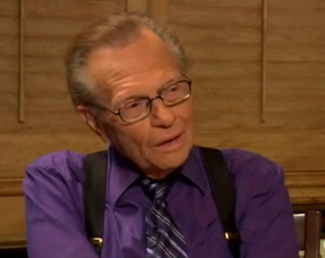Will Netflix, YouTube, Hulu Content Create a 'Second Revolution' in Television?
Forget broadcasting. Streaming services like Netflix think the next money to be made is in narrowcasting, a strategy that both mimics and challenges the television business model.
For those services, it may be just in time. On Tuesday, Netflix stock took a dive despite a profitable performance because of investor worries over the rising cost of licensing content. Following the model of premium cable like HBO and Showtime, Netflix and other streaming companies are instead drilling deeper into the market by making their own premium shows with A-list stars like Kevin Spacey and directors like David Fincher and Eli Roth.
Also read: Netflix Stock Sinks After Q3 Earnings Report
Netflix is in the middle of "the evolution of being perceived as a distributor to being a programmer," Ted Sarandos, Netflix's chief content officer, said earlier this month at TheWrap's annual media conference, TheGrill.
As more televisions are connected to the internet, barriers between the web and television are collapsing. Though the enthusiasm of viewers is not yet proven, that will potentially allow the likes of Hulu and Amazon to exponentially broaden their reach. Already, streaming companies have staked out a foothold in the new frontier:
>> Netflix, which first lured viewers with classic movies and kids' television, will air six original shows next year, including the David Fincher political thriller "House of Cards" and new seasons of "Arrested Development." The budgets (reported to be $100 million for "House of Cards) are big and so are the expectations.
>> Amazon has continued to develop Amazon Studios, which options scripts and is developing films via crowd-sourcing. It's announced more than a dozen projects in development, among them a zombie film involving Clive Barker and an adaptation of the self-published novel "Seed."
>> Hulu is flirting with its own in-house lineup, with series like the campaign dramedy "Battleground" and a talk show featuring Larry King.
>> YouTube has invested $100 million in original programming, with more money on the way. Nearly a year after it first announced an ambitious channels initiative, YouTube announced last week that it was doubling-down on its investment and backing new channels from the likes of Russell Simmons and Adam Carolla.
Also read: David Fincher's 'House of Cards' Gets Netflix Premiere Date
These digital companies are overhauling the way that consumers watch shows and broadening the definition of filmed entertainment. At the start of every season, Netflix releases all of a show's episodes simultaneously. The move is a nod to the binge habits of its members, Netflix says, who prefer to see an entire season in a few sittings as opposed to tuning in for the latest episode at a particular time every week.
It's also an acknowledgement to the longevity of shows on Netflix or Hulu, where viewers can watch them for years to come. That allows the companies to take long-term risks that a primetime-based network cannot.
YouTube's experiment may be even more radical. Instead of the broad hits that keep the lights on at traditional networks, the company wants to create scores of channels that appeal to specific niches -- from cooking to music to comedy.
"Let's be clear, Google is trying to do nothing less than to effect a second revolution in broadcasting, that is no less significant than when we moved from rabbit ears and four channels to pay TV," said Dan Cryan, director of digital media at IHS Screen Digest. "YouTube is in the process of fostering 1,000 niches in order to change the balance of the television economy again."
For the streaming companies, the move into original content is as much to do with economics. Currently, major studios are hiking licensing fees or shunning many exclusive contracts.
"It's a classic television network move," Cryan told TheWrap. "It's what dragged MTV from music videos to 'Jersey Shore' and HBO from having exclusive windows on movies to making 'Game of Thrones.' It is a tried and tested technique that is driven by a need to establish identity and to have control over their destiny by not being reliant on others for content."
Gone are the days when Netflix cast the only shadow across the streaming landscape, enabling it to secure the rights to old movies for relative pennies and license content no one else had.
This new competition is forcing companies to get creative -- fast. Netflix's stock plunged 15 percent in after-hours trading Tuesday after its third-quarter earnings report disappointed. Even though Netflix's subscription number have grown to more than 25 million, far more than say the roughly 2 million who subscribe to Hulu Plus, those numbers are not growing fast enough to keep up with rising licensing fees.
"Content owners are just raising the rent, and Netflix can't keep paying," James McQuivey, an analyst with Forrester Research, told TheWrap. "Studios are looking at these digital providers like Hulu, Amazon, Netflix and Apple as: 'If this is where the market needs to go, I need to charge them a lot more.'"
Increasingly, Netflix has seen content providers walk away or alter the terms of their deals.
Epix, which owns the digital rights to movies from Paramount, Lionsgate and MGM, signed a deal with Amazon in September, ending its exclusive agreement with Netflix. Later that month, Netflix decided to dial down the number of shows it hosts from A&E and History.
"The decision to do Netflix exclusively was because they were really the only game in town at that point in time," Epix CEO Mark Greenberg told TheWrap. "We live in a capitalistic society and are here to generate profit for our owners. We are doing that by trying to help reach a larger consumer base, hence the decision to go to Amazon."
Nor is this kind of disagreement over the value of content unique to Netflix. Variety reported in August that News Corp, which airs Fox, Comcast (NBC) and Disney (ABC) were considering ending their current relationship with Hulu, putting in jeopardy Hulu's advantage over competitors -- exclusive rights to stream ongoing TV shows. But with new players entering the space, the thirst for exclusive content has never been more intense, analysts say. That's where Amazon and the Google-owned YouTube, with their ability to write massive checks, may have a big advantage.
"Amazon lost millions when it built its Kindle business because it wanted to be the dominant book seller," Edward Jay Epstein, author of "The Hollywood Economist: The Hidden Financial Reality Behind the Movies," told TheWrap. "Can Netflix stand to lose millions? Where will those millions come from?"
For its part, Netflix insists that even the biggest companies have a limited tolerance for losing money.
That may be true, but the old way of luring customers won't last much longer. It is not enough to offer a library of older movies and shows; those options are available across nearly all of the major streaming services.
This has put the distributors in a tough position. Do they go the way of cable providers, who all offer the same content and lure customers with their service and package benefits? Or do they take the path pioneered by cable channels like HBO and Showtime and offer exclusive content – movies they license and original programming they create?
The answer, particularly for Netflix and Hulu, seems to be the second option. Many analysts see this thirst for original programming as a way of battling back against the networks for the rising fees, demonstrating their ability to create content.
"They are doing that to mess with their partners," McQuivey said. "It's a little bit of a threat. 'You should distribute with us because we're the future, and if you don't, we don't need you anyway."
Andy Forssell, Hulu's senior vice president for content, said the decision to back shows came about naturally. In the course of doing business, Hulu recognized certain shows weren't getting made that deserve a chance.
But that doesn't mean it can back everything that should get made.
"You have to make some programming choices," Forssell said. "It has to be less hunch driven and more data driven."
When it comes to deciding what to put their resources behind, Netflix, Hulu and Amazon, believe data is the key.
Because they know more about their users' preferences than anyone else, they can use that to effectively program not only their own original content, but to decide which shows and movies represent savvy investments. Before funding "House of Cards," for example, Netflix looked at various algorithms to see how its members had responded to Kevin Spacey and David Fincher movies.
"If we can address that audience pool, the only risk is that the show is mediocre," Sarandos offered. "Then we can back into the economics."
Related Articles:
Netflix's 'Lilyhammer' and Hulu's 'Battleground' Rely Too Heavily on Tried and True
Netflix's Ted Sarandos at TheGrill: 'We're a Television Network on Steroids' (Video)
'Arrested Development' Season 4 Footage Premieres at TheGrill



